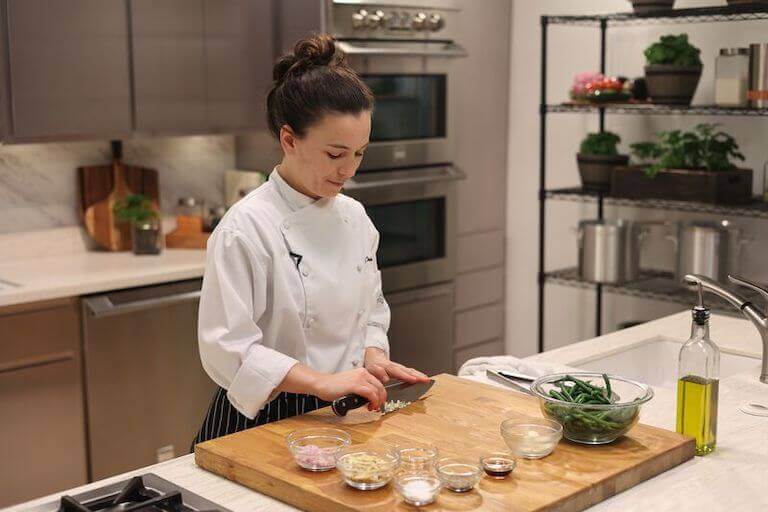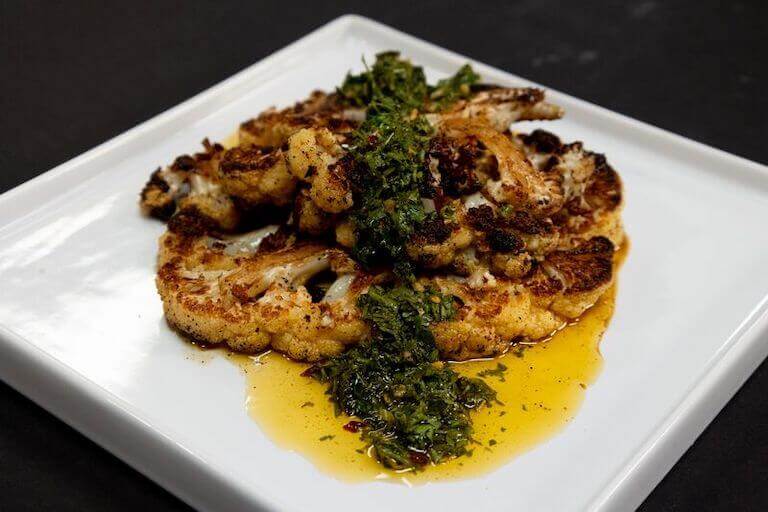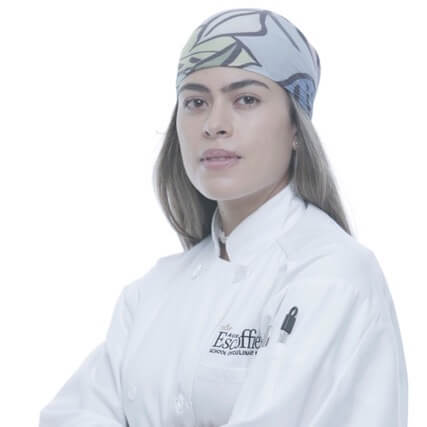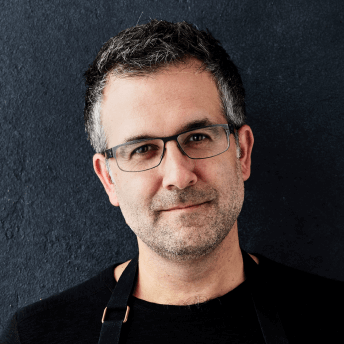In love with plant-based eating? Marveling over the diversity of heirloom tomatoes? Happily swapping seitan for sirloin? If this sounds like you, your passion might be so strong that you’re considering a career in plant-based cooking!
As is the case when you enter any profession, education can be a great first step. However, before you commit to enrolling in a plant-based culinary school, you probably want to understand the topics you’ll explore.
Here’s what you can discover and practice if you choose to enroll in one of Escoffier’s Plant-Based Culinary Arts programs.
Kitchen Fundamentals
No matter what kind of dishes you’re making or what specialty diet you’re cooking for, it’s helpful to start with a strong foundation. That’s why Escoffier’s Plant-Based Culinary Arts programs begin by introducing students to fundamentals like proper food safety, precise knife skills, allergen awareness, and accurate measurement.
You can then practice these skills as you precisely dice then sauté onions and mushrooms, mince garlic, blanch green beans, and organize ingredients for a perfectly balanced vinaigrette.

Along with these hard skills, you can also have the chance to begin honing important soft skills, like organization and clear communication. Not only are these skills crucial to improving your performance on the brigade de cuisine, but they can also help if you aim to open your own restaurant or plant-based food truck.
Plant-Based Cooking and Baking Methods
Once you’ve covered the basics, you can then take a deeper dive into the skills and techniques involved in plant-based cooking and baking. In the Plant-Based Culinary Foundations II course, you can build on your existing knowledge – for instance, exploring how to smoothly meld flavors as you cook a variety of soups and stocks. You can also practice the basic yet crucial skill of perfectly cooking legumes such as beans and lentils, as well as grains like rice, farro, and quinoa.
“You are able to learn a lot of skills you’re going to need in the future. You are not only learning your recipes, you’re learning the skills you are going to use in life.”*
Maria Rodriguez, Plant-Based Culinary Arts Student
Finally, in the Plant-Based Culinary Foundations III course, you can further hone your skills as you create more complicated dishes such as seitan bourguignon, tempeh satay, and grilled zucchini rolls. As you practice making these dishes, you not only have the chance to refine basic techniques, but to also explore flavors and practice your presentation and plating.
Keep in mind – all of these foundational skills are just the tip of the iceberg. Plant-based culinary school offers a wealth of applicable coursework that most students find as fun as it is challenging!
How to Modify Recipes to Fit a Plant-Based Diet
While a traditional culinary arts program might teach you how to make a lasagna filled with ricotta, mozzarella, and a classic Bolognese sauce, a plant-based program can help you explore how to modify classic recipes to fit a plant-based diet. For example, you may learn how to use cashews to make a creamy ricotta substitute and how to cook mushrooms so they provide a meaty texture to the finished dish.

As you explore these types of modifications, you may gradually become familiar with ingredients rarely seen outside of a plant-based diet. By learning how to cook seitan, tempeh, tofu, and other plant-based proteins, you may gain the confidence to eventually experiment with your own modifications.
Along with exploring how to give a plant-based twist to savory dishes, you can also dive into how to create plant-based versions of sweets, like ice cream and pastries. Not only can you explore how to swap plant-based products such as coconut milk for animal products like dairy, but you can also dive into the techniques that go along with these substitutions.
Plant-Based Menu Design
While cooking delicious food is a key component of becoming a chef, it’s certainly not all that’s involved. Along with knowing how to cook good food, you may also need to know how to explain your dishes to patrons, price them for profitability, and rotate ingredients with the seasons. That’s where menu design comes in.
Plant-based culinary school can not only help you explore how to utilize the menu as a tool for communication and economic planning, but it can also give you the chance to dive into details unique to a plant-based menu. For example, how do you label dishes so they appeal to both vegans and omnivores? What are the requirements around labeling something “vegan”?
“There has to be a reference point. If we did not serve our plant-based tuna product at Good Catch as plant-based tuna, and we basically called it ‘six legume processed flakes with seafood flavor, with ocean flavor,’ who the heck is going to buy that?”*
Chad Sarno, Co-founder of Wicked Health and Gathered Goods, Author of Crazy, Sexy Kitchen
In these classes, you may also explore how to design a menu with allergies and food restrictions in mind so that you can confidently serve a variety of future customers.
Plant-Based Wellness
While consumers explore plant-based eating for numerous reasons, many people are curious about the impact this diet can have on their health. And that’s no surprise, considering this type of diet may lower the risk of heart disease, hypertension, and diabetes. Even if you’re not interested in how diet impacts overall health, you should keep in mind that your customers may be.
That’s why students can explore science and philosophies related to plant-based diets. These include traditional systems like Ayurveda as well as emerging trends in the plant-based world.
If you find that you’re enamored with this topic, you can also explore enrolling in a Holistic Nutrition and Wellness program, or a plant-based nutrition certificate or other wellness program.
Global Influence on Plant-Based Cuisine
To become a well-rounded chef, it’s helpful to be aware of the different flavors and dishes that exist throughout the world. While traditional culinary programs may dive into global dishes focused on meat, dairy, and other animal products, students in a plant-based culinary school can explore how different cultures utilize vegetables, grains, legumes, nuts, and other ingredients.

For example, students may spend time in the kitchen learning about the warming spices of Morocco while cooking a vegetable tagine and exploring how fermentation impacts flavor while making a traditional Korean kimchi. Escoffier students also explore the flavors present in traditional Japanese, Italian, Indian, Thai, and French cuisines.
Farm to Table Principles
There’s no doubt that plant-based eating and sustainability go hand-in-hand. That’s why students in Escoffier’s Plant-Based programs not only learn how to work with certain ingredients in the kitchen, but can also explore where these ingredients come from.
Students in Escoffier’s Plant-Based programs enroll in an entire course included in their curriculum focusing on Seasonal Plant-Based Cuisine. In this course, they explore how to cook with the seasonal ingredient availability in mind, as well as how to select these ingredients at a farmers’ market, grocery store, or other outlet.

To become acquainted with farm-to-table cooking, you may practice making dishes such as a rich sweet corn chowder, crisp snap pea and radish salad, and a hearty cauliflower steak.
Business and Entrepreneurship
While a plant-based chef is one possible career, attending plant-based culinary school can help set you up for a variety of careers! Whether you dream of opening your own plant-based restaurant, have your sights set on becoming a private chef, or are interested in recipe development, a basic understanding of business and entrepreneurship can help set you up for success.
Escoffier’s Plant-Based programs may cover topics including business management, government regulations, ethics, and more.
Learn More About Plant-Based Culinary School
While the aforementioned topics give you a hint of what you could learn in one of Escoffier’s Plant-Based Programs, there’s so much more to discover. With access to a team of professional Chef Instructors, hands-on industry externships, and an alumni network, plant-based culinary school can give you the solid foundations you need to excel in this industry.
We’re happy to provide more detailed information about what our students can explore, answer questions, and discuss financing options. To learn more about Escoffier’s programs, contact us today.
Want more information on plant-based cooking? Try these next:
- What Credentials Do You Need to Become a Plant-Based Chef?
- How Is Plant-Based Meat Made?
- Plant-Based vs. Vegan: Why Chefs Need to Know the Difference
*Information may not reflect every student’s experience. Results and outcomes may be based on several factors, such as geographical region or previous experience.

 “You are able to learn a lot of skills you’re going to need in the future. You are not only learning your recipes, you’re learning the skills you are going to use in life.”*
“You are able to learn a lot of skills you’re going to need in the future. You are not only learning your recipes, you’re learning the skills you are going to use in life.”* “There has to be a reference point. If we did not serve our plant-based tuna product at Good Catch as plant-based tuna, and we basically called it ‘six legume processed flakes with seafood flavor, with ocean flavor,’ who the heck is going to buy that?”*
“There has to be a reference point. If we did not serve our plant-based tuna product at Good Catch as plant-based tuna, and we basically called it ‘six legume processed flakes with seafood flavor, with ocean flavor,’ who the heck is going to buy that?”*